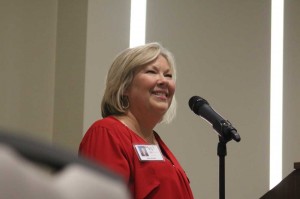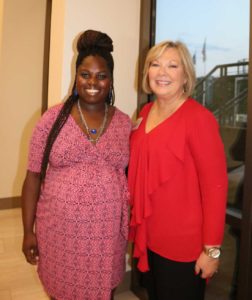Trauma in ACEs
When I met Davis for the first time at the PtW office with Project Director Nancy Stanley, he revealed his ACEs score as calmly as any doctor delivers life-altering news.
His score made Stanley’s jaw fall wide open. His gaze stayed stoically focused on moving the conversation forward, not backward to dwell on the past.

ACEs stands for Adverse Childhood Experiences. A 10-question survey developed by the Centers for Disease Control and Prevention, it was designed to gauge the effects of trauma on children and adults. Of the 10 questions asked, half pertain to personal trauma — physical, verbal, and sexual abuse in addition to physical or emotional neglect — whereas the other half of the questions pertain to family members — substance abuse, physical abuse, incarceration, mental illness, or the absence of a parent. PtW specialists often encourage clients to take an ACEs survey to better understand the extent of influence of a trauma on a client in their care.
“Trauma is in the eye of the beholder,” said PtW’s social marketer Kay Barkin, offering her opinion to challenge anyone dismissing any instance of trauma as minor, menial, or overblown. The ACEs questions offer a range of interpretations in regard to severity of experience, but anyone reading the questions realizes the gruesome potential of any “yes” answer to any one question. The survey is available at Acestoohigh.com.
When trauma imprints, children – even infants – respond symptomatically, showing signs of irritability, helplessness, aggression, rage, withdrawal, restlessness, speech disorders, delayed behavioral learning, and many other symptoms that researchers are just beginning to recognize as connected to trauma.
The Mental Health Connection of Tarrant County furnishes parents and caregivers with more information and resources on the symptoms of trauma, but the PtW office imparts a personal perspective.
“The reason why I hired [Davis] is because he has gone through the foster care system himself and has had some rowdy days, but his contribution to our youth is that he can say he’s been in their shoes,” Stanley said. “When they hear and see that he’s got this bachelor’s degree and is starting this master’s at [the University of Texas at Arlington], he makes them feel hopeful.”
For over 26 years, Stanley has served hundreds of children through her work in the field of mental health support services. She may not always know what a certain child needs, she said, but she’s always able to find a specialist who does.
One specialist, Karlonda Favors, can alter the course of any conversation with her calmly composed tone of voice. More than once, Stanley has seen how Favors can ease the most hyper-vigilant of anxiety types and how Favors’ own experience transitioning out of the foster care system helps her connect to clients in a more personal way.
In one case, Favors was able to connect with her client over much more than the challenges of the foster care system.

“This particular young lady reminds me of my own transition process when I came out of foster care,” she said. “We went to the same colleges, worked part-time through school, and when I met [this client] she was expecting her first child. I was about her age when I had my first kid.”
Favors, who is now happily married and expecting another child, visited her client in the hospital after the baby was born. She described the visit as personally meaningful because she remembered the outpouring of support she received during her first pregnancy. Since her client’s delivery, the two have been meeting at coffee shops and restaurants to catch up and talk through the challenges of being a single mom.
“We talk about her struggles with co-parenting and dealing with child support,” explained Favors. “I let her know I can relate.”
One of her client’s goals was to secure a quality pediatrician, which she accomplished with Favors’ guidance. Her client’s second goal was higher education, and she was able to enroll at the University of North Texas last spring, when she began her studies in social work.
“She looks at people like myself and the other Youth Transition Specialists,” Favors said, “and she sees their transitions as examples she aspires to follow.”
Favors said her client’s third goal is finding a healthy method for coping with stress. The client’s method of choice required adoption paperwork, but eventually she was able to bring the soft purrs of a feline friend into her home, the first home the client has been able to establish on her own as a young adult.
Rural Isolation
With so many mental health challenges going unseen, or unnoticed, in the city of Fort Worth, what can be even more difficult to spot are the mental health challenges of young adults living in rural counties.
“It’s harder to find youth out there,” said Sara Shepherd, PtW’s Youth Engagement Specialist. “Where it’s very secluded, you either fit in, or you don’t. There’s not a lot of in-between, not a lot of acceptance outside of sports jocks and cheerleaders.”
Youth in the six rural North Texas counties of Erath, Hood, Johnson, Palo Pinto, Parker, and Somervell are assigned to work with Danielle Elliott, who can easily recall many success stories from her work with PtW, but there’s one story she said she’ll never forget.
“I had a youth that came from a very poor family living in a one-bedroom apartment, and when I first met her, she said, ‘You’re not going to make me leave the house, are you?’ ”
Elliott, impersonating the wide-eyed look she remembers on her client’s face, went on to tell about the times when the pair tried driving around Stephenville, starting with just 10-15 minutes in the car.
During a visit to buy new clothes, Elliott learned her client had never had Whataburger. The client expressed interest in going but only if she could stay in the car, until they arrived, when she decided she could enter and even eat inside what seemed to be a relatively uncrowded restaurant. With her back against a wall and no one watching, the client ate in public for only a few minutes before a busload of male soccer players from a nearby high school came in. And yet, the young woman managed to finish her meal. Eventually, she found the courage to make the drive to “the big city” — Fort Worth, of course — to join other PtW clients for a youth group outing.
Later, Elliott would learn that this girl had been in a car wreck at a young age, which helped her caregivers better comprehend how one incidence of childhood trauma deeply affected the mental health of a youth for years to come.
“We don’t have all the answers,” Elliott said. “We learn every single day, and what [we] need to do is point [the youth] in the right direction to help them find these answers.”











